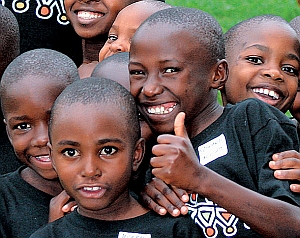Are Child Rights Turning Disastrous?

 |
| What future for Africa's children? Photo courtesy |
Children went through successive stages of role development to ensure that they were socialized in their respective roles and responsibilities early in life. These roles depended on gender and age and included such activities as fetching water and firewood; tilling the land, taking care of livestock, hunting, weaving, pottery, warfare and fishing among others. A holistic approach to development was embraced and by the time a child transitioned to adulthood, he/she was adequately prepared to handle adult responsibilities and challenges.
Since bringing up a child was a collective responsibility, all adults in the community participated in inculcating the right skills, attitudes, values and knowledge in children. There was never a leadership vacuum in African communities as interaction with adult role models imparted leadership roles amongst the youth.
The United Nations Convention on the Rights of the Child provides for the following rights of the child: survival, development and protection rights. UNICEF in the program A World Fit for Children has summarized what are considered the 8 millennium goals for children worldwide. They include: putting children first, ending poverty, leaving no child behind, caring for every child, educating every child, protecting children from harm and exploitation, protecting children from war and combating HIV/AIDS. Of significance importance is the focus on the rights of children but no mention on their responsibilities.
In Kenya, the Children Act Cap 586 advocates for not only the rights of the child but also the duties and responsibilities of children. In the Act, a child is required to work for the cohesion of the family; respect his superiors at all times and assist them in case of need; use his physical and intellectual abilities to serve his community; preserve and strengthen social and national solidarity as well as the positive cultural values of the community. The child's age is taken into consideration in meeting these responsibilities.
This emphasis on child responsibility seems to resonate well with the traditional African community set-up which worked extensively well to prepare children for adulthood and more so for responsible leadership. It makes children internalize the fact that they have a duty to make their societies better and provide solutions to problems facing their communities. A responsible person for example, will never ask what his government; society or parent will do for him, but will be busy seizing opportunities, being innovative and actively participating in forums where solutions for issues affecting their communities are deliberated upon.
Currently, there is so much being done on child advocacy (especially legal and institutional reforms to enhance child protection) but no one seems to be concerned about their responsilities. This has led to children who are keen on demanding for their rights while on the other hand they are irresponsible; abuse themselves; cannot solve simple societal problems and are dependent on their parents and governments.
The father of modern psychology, Sigmund Freud, came up with psychosexual stages that affect adult personality. He believed that each of these stages presented a conflict that a child has to resolve successively to move to the next stage. If this is not resolved well, fixation occurs as a result of either gratification or frustration of the child by that stage. A fixated adult exhibits childhood characteristics of the particular stage. Seemingly this is what has happens to our children who have many unresolved issues that spill over to adulthood causing them to display a negative attitude towards work, moral decay and a warped value system.
The overemphasis on child rights at the expense of child responsibility has raised a generation of passive and litigious youths who though clamoring for leadership roles, are a recipe for disaster. For Africa to get back on the right path, we have to place great emphasis on child responsibilities. We must teach our children how to weave opportunities out of challenges and respond to their environment. Until this is done, Africa’s youths will never fit in the local and global economy.
By Grace Mukunzi,
A Kenyan based Psychologist.
